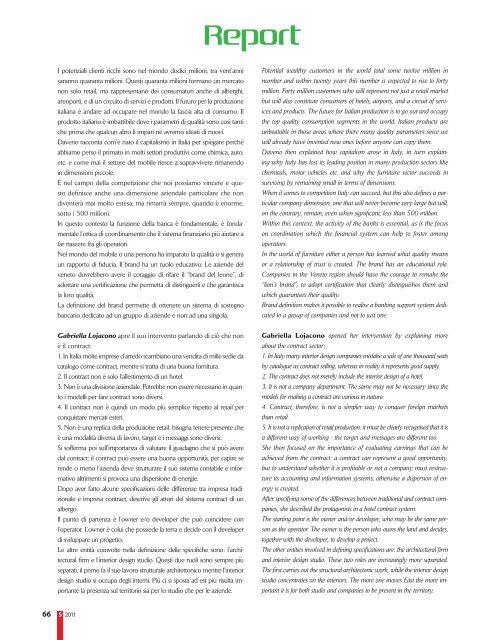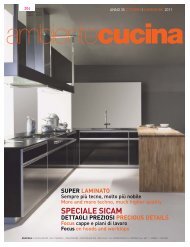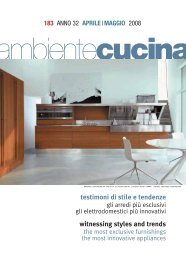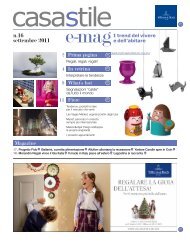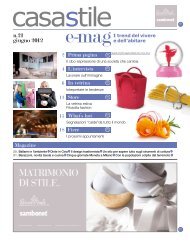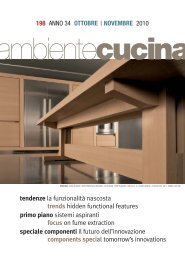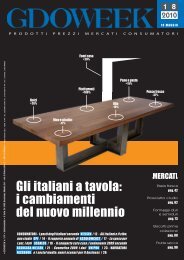Create successful ePaper yourself
Turn your PDF publications into a flip-book with our unique Google optimized e-Paper software.
I potenziali clienti ricchi sono nel mondo dodici milioni, tra vent’anni<br />
saranno quaranta milioni. Questi quaranta milioni formano un mercato<br />
non solo retail, ma rappresentano dei consumatori anche di alberghi,<br />
areoporti, e di un circuito di servizi e prodotti. <strong>Il</strong> futuro per la produzione<br />
italiana è andare ad occupare nel mondo la fascia alta di consumo. <strong>Il</strong><br />
prodotto italiano è imbattibile dove i parametri di qualità sono così tanti<br />
che prima che qualcun altro li impari ne avremo ideati di nuovi.<br />
Daverio racconta com’è nato il capitalismo in Italia per spiegare perché<br />
abbiamo perso il primato in molti settori produttivi come chimica, auto,<br />
etc. e come mai il settore del mobile riesce a sopravvivere rimanendo<br />
in dimensioni piccole.<br />
É nel campo della competizione che noi possiamo vincere e questo<br />
definisce anche una dimensione aziendale particolare che non<br />
diventerà mai molto estesa, ma rimarrà sempre, quando è enorme,<br />
sotto i 500 milioni.<br />
In questo contesto la funzione della banca è fondamentale, è fondamentale<br />
l’ottica di coordinamento che il sistema finanziario più aiutare a<br />
far nascere fra gli operatori.<br />
Nel mondo del mobile o una persona ha imparato la qualità o si genera<br />
un rapporto di fiducia. <strong>Il</strong> brand ha un ruolo educativo. Le aziende del<br />
veneto dovrebbero avere il coraggio di rifare il “brand del leone”, di<br />
adottare una certificazione che permetta di distinguerli e che garantisca<br />
la loro qualità.<br />
La definizione del brand permette di ottenere un sistema di sostegno<br />
bancario dedicato ad un gruppo di aziende e non ad una singola.<br />
Gabriella Lojacono apre il suo intervento parlando di ciò che non<br />
è il contract:<br />
1. In Italia molte imprese d’arredo scambiano una vendita di mille sedie da<br />
catalogo come contract, mentre si tratta di una buona fornitura.<br />
2. <strong>Il</strong> contract non è solo l’allestimento di un hotel.<br />
3. Non è una divisione aziendale. Potrebbe non essere necessario in quanto<br />
i modelli per fare contract sono diversi.<br />
4. <strong>Il</strong> contract non è quindi un modo più semplice rispetto al retail per<br />
conquistare mercati esteri.<br />
5. Non è una replica della produzione retail: bisogna tenere presente che<br />
è una modalità diversa di lavoro, target e i messaggi sono diversi.<br />
Si sofferma poi sull’importanza di valutare il guadagno che si può avere<br />
dal contract: il contract può essere una buona opportunità, per capire se<br />
rende o meno l’azienda deve strutturare il suo sistema contabile e informativo<br />
altrimenti si provoca una dispersione di energie.<br />
Dopo aver fatto alcune specificazioni delle differenze tra impresa tradizionale<br />
e impresa contract, descrive gli attori del sistema contract di un<br />
albergo.<br />
<strong>Il</strong> punto di partenza è l’owner e/o developer che può coincidere con<br />
l’operator. L’owner è colui che possiede la terra e decide con il developer<br />
di sviluppare un progetto.<br />
Le altre entità coinvolte nella definizione delle specifiche sono: l’architectural<br />
firm e l’interior design studio. Questi due ruoli sono sempre più<br />
separati, il primo fa il suo lavoro strutturale architettonico mentre l’interior<br />
design studio si occupa degli interni. Più ci si sposta ad est più risulta importante<br />
la presenza sul territorio sia per lo studio che per le aziende.<br />
66 5<br />
2011<br />
Potential wealthy customers in the world total some twelve million in<br />
number and within twenty years this number is expected to rise to forty<br />
million. Forty million customers who will represent not just a retail market<br />
but will also constitute consumers of hotels, airports, and a circuit of services<br />
and products. The future for Italian production is to go out and occupy<br />
the top quality consumption segments in the world. Italian products are<br />
unbeatable in those areas where there many quality parameters since we<br />
will already have invented new ones before anyone can copy them.<br />
Daverio then explained how capitalism arose in Italy, in turn explaining<br />
why Italy has lost its leading position in many production sectors like<br />
chemicals, motor vehicles etc. and why the furniture sector succeeds in<br />
surviving by remaining small in terms of dimensions.<br />
When it comes to competition Italy can succeed, but this also defines a particular<br />
company dimension, one that will never become very large but will,<br />
on the contrary, remain, even when significant, less than 500 million.<br />
Within this context, the activity of the banks is essential, as is the focus<br />
on coordination which the financial system can help to foster among<br />
operators.<br />
In the world of furniture either a person has learned what quality means<br />
or a relationship of trust is created. The brand has an educational role.<br />
Companies in the Veneto region should have the courage to remake the<br />
“lion’s brand”, to adopt certification that clearly distinguishes them and<br />
which guarantees their quality.<br />
Brand definition makes it possible to realise a banking support system dedicated<br />
to a group of companies and not to just one.<br />
Gabriella Lojacono opened her intervention by explaining more<br />
about the contract sector:<br />
1. In Italy many interior design companies mistake a sale of one thousand seats<br />
by catalogue as contract selling, whereas in reality it represents good supply.<br />
2. The contract does not merely include the interior design of a hotel.<br />
3. It is not a company department. The same may not be necessary since the<br />
models for making a contract are various in nature.<br />
4. Contract, therefore, is not a simpler way to conquer foreign markets<br />
than retail.<br />
5. It is not a replication of retail production: it must be clearly recognised that it is<br />
a different way of working - the target and messages are different too.<br />
She then focused on the importance of evaluating earnings that can be<br />
achieved from the contract: a contract can represent a good opportunity,<br />
but to understand whether it is profitable or not a company must restructure<br />
its accounting and information systems, otherwise a dispersion of energy<br />
is created.<br />
After specifying some of the differences between traditional and contract companies,<br />
she described the protagonists in a hotel contract system.<br />
The starting point is the owner and/or developer, who may be the same person<br />
as the operator. The owner is the person who owns the land and decides,<br />
together with the developer, to develop a project.<br />
The other entities involved in defining specifications are: the architectural firm<br />
and interior design studio. These two roles are increasingly more separated.<br />
The first carries out the structural architectonic work, while the interior design<br />
studio concentrates on the interiors. The more one moves East the more important<br />
it is for both studio and companies to be present in the territory.


